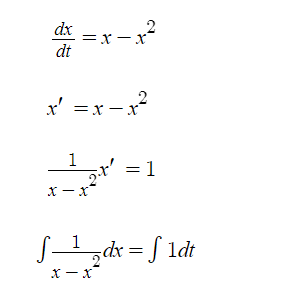Calculus: Early Transcendentals
8th Edition
ISBN:9781285741550
Author:James Stewart
Publisher:James Stewart
Chapter1: Functions And Models
Section: Chapter Questions
Problem 1RCC: (a) What is a function? What are its domain and range? (b) What is the graph of a function? (c) How...
Related questions
Question
100%
HW5P1
![**Problem 1: Solve Initial Value Problems by Separation of Variables and Partial Fractions**
Separate variables and use partial fractions to solve the initial value problems.
(a)
\[ \frac{dx}{dt} = x - x^2; \quad x(0) = 2. \]
(b)
\[ \frac{dx}{dt} = 9 - 4x^2; \quad x(0) = 0. \]](/v2/_next/image?url=https%3A%2F%2Fcontent.bartleby.com%2Fqna-images%2Fquestion%2Fc3edbe93-d39c-43f4-8aa9-2c034a88e626%2F1bc5c3fb-e2e2-4ad7-b243-2a8c1813ab6a%2Fkgoalpk_processed.png&w=3840&q=75)
Transcribed Image Text:**Problem 1: Solve Initial Value Problems by Separation of Variables and Partial Fractions**
Separate variables and use partial fractions to solve the initial value problems.
(a)
\[ \frac{dx}{dt} = x - x^2; \quad x(0) = 2. \]
(b)
\[ \frac{dx}{dt} = 9 - 4x^2; \quad x(0) = 0. \]
Expert Solution
Step 1

Step by step
Solved in 3 steps with 3 images

Follow-up Questions
Read through expert solutions to related follow-up questions below.
Follow-up Question
Can you do part 1b of this question? Thanks!

Transcribed Image Text:**Problem 1**: Separate variables and use partial fractions to solve the initial value problems.
**(a)** \(\frac{dx}{dt} = x - x^2\); with initial condition \(x(0) = 2\).
**(b)** \(\frac{dx}{dt} = 9 - 4x^2\); with initial condition \(x(0) = 0\).
In these problems, you are tasked with solving differential equations using the method of separation of variables, followed by applying partial fraction decomposition to integrate the resulting expression. Each part involves an initial value condition that will be used to find the particular solution.
Solution
Recommended textbooks for you

Calculus: Early Transcendentals
Calculus
ISBN:
9781285741550
Author:
James Stewart
Publisher:
Cengage Learning

Thomas' Calculus (14th Edition)
Calculus
ISBN:
9780134438986
Author:
Joel R. Hass, Christopher E. Heil, Maurice D. Weir
Publisher:
PEARSON

Calculus: Early Transcendentals (3rd Edition)
Calculus
ISBN:
9780134763644
Author:
William L. Briggs, Lyle Cochran, Bernard Gillett, Eric Schulz
Publisher:
PEARSON

Calculus: Early Transcendentals
Calculus
ISBN:
9781285741550
Author:
James Stewart
Publisher:
Cengage Learning

Thomas' Calculus (14th Edition)
Calculus
ISBN:
9780134438986
Author:
Joel R. Hass, Christopher E. Heil, Maurice D. Weir
Publisher:
PEARSON

Calculus: Early Transcendentals (3rd Edition)
Calculus
ISBN:
9780134763644
Author:
William L. Briggs, Lyle Cochran, Bernard Gillett, Eric Schulz
Publisher:
PEARSON

Calculus: Early Transcendentals
Calculus
ISBN:
9781319050740
Author:
Jon Rogawski, Colin Adams, Robert Franzosa
Publisher:
W. H. Freeman


Calculus: Early Transcendental Functions
Calculus
ISBN:
9781337552516
Author:
Ron Larson, Bruce H. Edwards
Publisher:
Cengage Learning